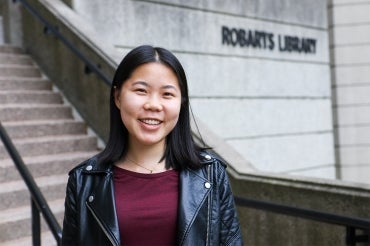'Do I eat fruit or do I not eat fruit?' U of T undergraduate research award-winner investigates health effects of sugar

Published: July 16, 2019
Through her research, Danielle Lee knew that sugar was a cause of non-alcoholic fatty liver disease, but still found the relationship perplexing since even healthy foods – dairy, grain products, fruits and vegetables – contain sugar.
“The main message of avoiding sugars can get really confusing,” says Lee, who recently completed her undergraduate studies at the University of Toronto and is preparing to return to do a master’s degree.
“Do I eat fruit or do I not eat fruit? Do I eat desserts with sweets or not?”
It’s a question likely shared by many Canadians – and one that Lee, a Woodsworth College alumna, had a chance to explore during a fourth-year independent study project with John Sievenpiper, an associate professor in the department of nutritional sciences in the Faculty of Medicine.
She found that sugar-sweetened beverages resulted in harmful effects while healthier foods, like fruits, showed a decrease in fatty liver disease markers – results that initially came as a surprise.
“I know that fruit juice can be easily over-consumed,” says Lee, one of two undergraduate students who undertook independent study in Sievenpiper’s lab. “You can drink a cup and not realize you’ve eaten the equivalent of five fruits.
“[But] because of the potential other nutrients that can be included, like polyphenols and some fibre, it can be counteractive to sugars.”
Such research could have an impact on health policies and dietary recommendations that help manage and prevent fatty liver disease. The project also identified where future research is needed – for example, the effects of specific food sources on the disease.
Lee’s work, not to mention her research techniques, caught the eye of U of T Libraries. In June, it awarded her an undergraduate research prize, which recognizes undergraduates for their effective and innovative use of information sources in course assignments. The $1,000 prize provides students with an opportunity to reflect on their experience and showcase their research beyond the classroom.
“I’m very thankful,” says Lee, who is one of six prize-winners. “There’s so much research going on at U of T and all these amazing students. To be recognized for something as high as the libraries’ research prize meant a lot to me.
“I put in a lot of work and it’s good to know that your work is acknowledged and could be used for other things as well.”
The winning papers, including Lee’s, are available to read through TSpace, U of T’s open access digital research repository.
Read more about the other award-winners
To arrive at her findings, Lee undertook a systematic review and meta-analysis of studies relevant to her topic. She obtained 3,328 studies from three online databases available through the U of T Libraries system, reading each one to determine if it was appropriate to include in the meta-analysis.
In the end, Lee analyzed 18 studies to make her argument. With help from Sievenpiper’s team, she pulled data from the studies, dealt with computational issues including missing data, wrote up findings and defended them.
As for next steps, Lee plans to continue her research as she begins her Master of Science under the supervision of Sievenpiper.
“The project and the award – all of this – was a springboard that allowed her to continue to develop more research questions, dig deeper and get some more data out,” Sievenpiper says.
“It only makes sense that we continue the journey.”



